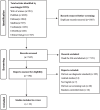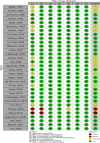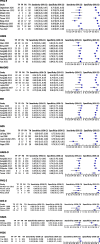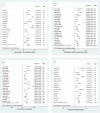Validity of evaluation scales for post-stroke depression: a systematic review and meta-analysis
- PMID: 39148052
- PMCID: PMC11325659
- DOI: 10.1186/s12883-024-03744-7
Validity of evaluation scales for post-stroke depression: a systematic review and meta-analysis
Abstract
Background: Post-stroke depression (PSD) is closely associated with poor stroke prognosis. However, there are some challenges in identifying and assessing PSD. This study aimed to identify scales for PSD diagnosis, assessment, and follow-up that are straightforward, accurate, efficient, and reproducible.
Methods: A systematic literature search was conducted in 7 electronic databases from January 1985 to December 2023.
Results: Thirty-two studies were included, the Patient Health Questionnaire-9 (PHQ-9) and Hamilton Depression Scale (HDRS) had higher diagnostic accuracy for PSD. The sensitivity, specificity, and diagnostic odds ratio of PHQ-9 or diagnosing any depression were 0.82, 0.87, and 29 respectively. And for HDRS, used for diagnosing major depression, the scores were 0.92, 0.89, and 94. Furthermore, these two scales also had higher diagnostic accuracy in assessing depressive symptoms during both the acute and chronic phases of stroke. In patients with post-stroke aphasia and cognitive impairment, highly diagnostic scales have not been identified for assessing depressive symptoms yet.
Conclusions: The PHQ-9 and HDRS scales are recommended to assess PSD. HDRS, which demonstrates high diagnostic performance, can replace structured interviews based on diagnostic criteria.
Keywords: Depression Scale; Meta-analysis; Post-stroke depression; Validity.
© 2024. The Author(s).
Conflict of interest statement
The authors declare no competing interests.
Figures





References
-
- GBD 2021 diseases and injuries collaborators. Global incidence, prevalence, years lived with disability (YLDs), disability-adjusted life-years (DALYs), and healthy life expectancy (HALE) for 371 diseases and injuries in 204 countries and territories and 811 subnational locations, 1990-2021: a systematic analysis for the Global burden of disease study 2021. Lancet. 2024;403(10440):2133–61. - PMC - PubMed
Publication types
MeSH terms
LinkOut - more resources
Full Text Sources
Medical

